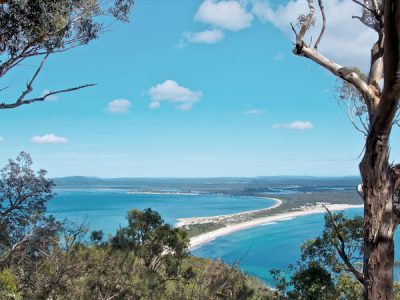COASTAL CHARACTERS

Yaccaba Headlnad Walk, Myall Lakes National Park (pc: www.nationalparks.nsw.gov.au)
Do you have unforgettable characters from your past? I have many, but there are three I met as an undergraduate honours student in 1960 that I will never forget.
I was very fortunate in being allowed to do my honours thesis in the Port Stephens-Myall Lakes area. The topic was on the geomorphology and Quaternary history of this area. In those days the student was able to spend the entire second term ( June to August) in the field; it was a magical time meeting various scientists who had an interest in the ecology and geology of the area, such as Peter McKenzie then with BHP and Tony Martin, a palynologist at Sydney University. But it was the opportunity to associate with three local characters that made me think more about how place influences people and people influences place. In turn, they had an impact on my life.
The first was a veteran from the First World War: Joe Robinson. He and his extended family lived at Anna Bay in an weatherboard house overlooking the flats behind the dunes. What a kind, gentle man full of local stories going back to his youth and his days after the war. He had ceased farming by the time I met him, but I learnt about the work in draining the flats, encountering tough old mangrove stumps along the way. What he showed me was how the local landscape had been changed by years of clearing, draining, and cropping in the low-lying lands, and on the edge of the stabilised dunes. He was a chicken farmer. Stories of military exercises in the active dunes and the occupation of parts of the Gan Gan/Tomaree area by American troops during WW2 were told to me sitting around a fire at night. What intrigued him were my air photos and how I was using them to tell the story of landform history. This was new to him and he found my observations of interest; he was a good listener and knew that at his age there was more to learn. A lesson for us all! He was intrigued enough to get me invited to tell what I knew to the local Rotary Club, my first public talk.
The second character was an immigrant from Holland: Hans Pacy. He was the highly respected local GP in Tea Gardens. A street is named after him. Hans was fascinated by local history. We went on walks up Yaccaba Hill and around Winda Woppa. He asked many questions of me, always testing me and in turn I had lots to ask of him. I never knew why he came to be living here, but that did not matter, he had found his home and his curiosity was infectious. This man somehow learnt about the mapping of Port Stephens by Watling in the 1790s and knew I could find the original drawings of this convict artist in the British Natural History Museum. In 1964, I had the opportunity of visiting London and followed up his suggestion and obtained a copy of the drawing of the shoals of the entrance to the Port Stephens which is reproduced in the monograph published by ANU Press in 1992.
Harry Legge is the third character and in some ways the most fascinating. He was born in 1879 and died in 1964. Around 1906 he moved to Bombah Point on the shores of the Broadwater, part of the Myall Lakes. He was living with his wife, Emily, in a two story weatherboard guesthouse built in 1927 when I turned up. This place had been the centre of eco-tourism of the Myall Lakes for decades. It still is a great holiday place in which there are many images of the time they were running the show. Diplomats, and other wealthy folk, came by boat to Legge’s Camp to hunt and fish. What stores he had to tell. Even in 1960 there was no electricity, but the food was great and the fire warmed the place where we chatted. I learnt much from him on the hydrology of the lakes, even cross-referencing his history with that from Pacy. He also knew about the flora and fauna in the dunes and in the lake waters. There was so much to absorb. By day, he ferried me across the narrows at the Point and I would head off into the dunes and to the beach always excited at night to tell him what I had seen. It was like being a child reporting back to father. He listened patiently then embarked on another set of stories—what a character!
Memories like these can be so rewarding. Perhaps they come to me now as quite rosy recollections, but they make up a part of one’s experiences and help direct you along a path never to be forgotten. I was very privileged to know and learn from these three men.
Words by Prof Bruce Thom. Please respect Bruce Thom’s thoughts and reference where appropriately: (c) ACS, 2016, posted 26th February 2016, for correspondence about this blog post please email admin@australiancoastalsociety.org.

